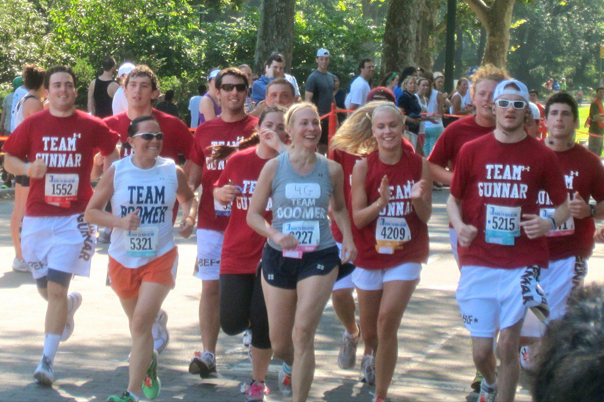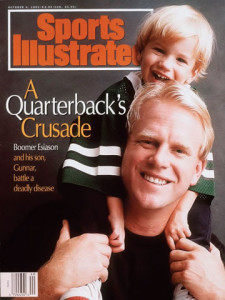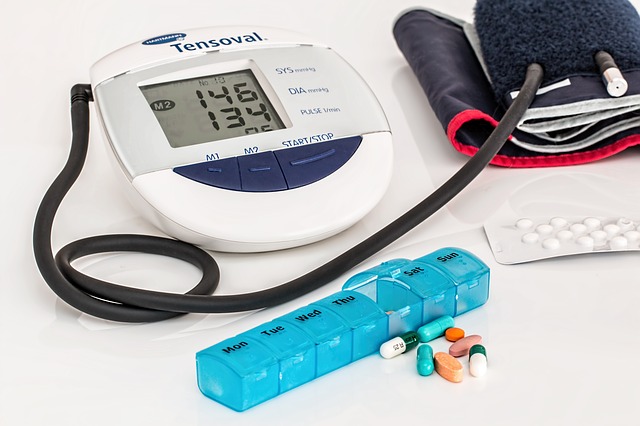Cystic fibrosis is a major emotional burden; there is no disputing that. I think sometimes what comes of the emotional stress is a hesitancy for people to really open up about CF. Too often do I talk to people with CF only to find out that they aren’t very open about their disease.
Now, I am certainly not a person to tell someone how to live his or her life, but it breaks my heart when I hear about a person struggling because he or she can’t talk about the disease with others. It is not a label. People may call me a “patient,” “CFer,” “cystic,” “fibro” or a million different other things, but I never listen to those, because they are labels.
Cystic fibrosis is a disease that I live with and a disease that nearly 70,000 people across the world live with. It’s not a label, it’s a bump in the road, and often the first step towards success is taking ownership of the challenge.
When I started this blog nearly two years ago, I wrote about four of my ways to let someone know about my life with CF. You can check that out HERE.
With this post, I want to share with you 15 different reasons why I share my disease with the world, and if you’re a person with CF, why I think you should too.
Success starts with you
The only way you are going to succeed in this world is if you can accept that you are capable of anything. We have to earn our success, and the opportunity only shows itself if we give ourselves the chance to succeed. We make our own “luck.” For people with CF the opportunity to be successful only comes around if we are able to remain compliant with medications and give ourselves the best possible care available. As someone with CF there is nothing more important in my life than my own wellbeing. Compliancy begins with understanding the challenges in front of me, and the repercussions of failing to overcome whatever stands in my way.
Cystic fibrosis is not evil
If I tell someone that I have CF, it’s not like I’m all of a sudden going to be banished by society, or deemed public enemy number one. More often than not, if I tell someone new that I have CF, I am going to be accepted with open arms. People love inspirational shit. Be that inspiration for someone.
College Roommates
When people with CF go to college hundreds of miles away from mom and dad, they are often put into one of their first legitimate situations where they have to make a choice – do I tell my peers about my CF or not? At some point during the first week of college, people with CF are faced with that decision. Time and again I have heard horror stories about people with CF who hide their disease from their roommates only to find their health suffer and college experience ruined mere weeks into the semester. Here’s the deal. What is the absolute worst thing that can happen if a roommate or a new “friend” refuses to accept your CF? An awkward conversation, followed by a room change or a path to a new group of college “friends.” If your college roommate isn’t going to be an advocate for you from day one, then why even bother with that person?
The Americans with Disabilities Act
If I somehow have developed an international following, and if you fall into that demographic while reading this, I’m not really sure how this will apply. America is the best obviously. (I’m sure there is something similar in your country too)
The ADA can often serve as a best friend to people with CF. When I was a young and naive college student, I understood the law to be a crutch of sorts, and was hesitant to believe in it. I was very wrong. The ADA is designed to protect people who have disabilities – cystic fibrosis, whether you want to believe it or not, is a disability. There are times in life when CF can create such a problem that normal responsibilities are unreasonable. For example, my senior year of college, I was diagnosed with pneumonia and had to spend significant time in the hospital. During that time I missed several assignments and a midterm. The ADA gave me the ability to negotiate a course of action to make up the work on my terms. Take it from me, there is no greater feeling than having a little power over a tenured professor who feels like he runs the world.
There are perks
This one kind of branches off the last point, but also extends to a person’s common sense. Any reasonable person will want you to succeed just as much as you would like to. In certain situations, leveling the playing field can often be your best ally as a person with CF. What do I mean by that? The Boston College student-housing situation is arguably the worst in the country. A simple stroll through the dorms will tell you that much. The school is just starting to replace many of the old dorms making this alum proud, but that’s beside the point. A friend of mine with CF went to BC a couple years ahead of me and gave me the heads up prior to my freshman year. She let me know that if I declared to the school that I am a person with CF the university would do whatever it could to accommodate my needs. When housing selection rolled around each year (at BC students live on campus for three of the four years, it’s a weird tradition, I know), I always had first pick. By the time I was a senior, I figured out exactly what I needed for a safe living environment after some trial and error the previous three years. For my final year, BC offered to replace the floors, doors, cabinets and furniture in my dorm room. On top of that, they removed the carpet entirely and installed new air conditioning and heating units. BC made it a priority for the students to have a chance to succeed, and that’s exactly what they did when the school essentially renovated my dorm room – the university leveled the playing field for me. There is no reason why your school can’t do the same thing.
There are more perks
Let’s move away from the college examples to something a little more real world. Several years ago, my parents told me that I should apply for a handicap parking permit. Much like I did with the ADA, I initially refused to accept it, but after several conversations with my doctor and parents, I finally agreed. To this day, I only use it in certain situations, but it can be useful a lot of the time. I think it’s fair to say that most people with CF like to feel like we are self-sustaining. Even when we are sick, we like to go through everyday activities like nothing is wrong. Well, that’s all fun and games until I am on a PICC line, trying to carry ginormous bags across half way across a parking lot, all the while feeling like I am about to suffocate. Not only is that a dumb idea, it is irresponsible and dangerous. When people with CF get sick, the body goes into a delicate state. There is no reason to jeopardize an already difficult situation. A handicap permit is not the easy way out, rather it can be used as a baby step on the road to recovery. It’s also super fun when an asshole comes up to me to question my use of the permit. All I need to do is flash my feeding tube, and the problem goes right away.
Trust
There is nothing more valuable in this world than trust. If I expect someone to trust me, then I have to be honest about everything, there’s just no way around that. The way I see it, if I can’t be honest to myself about the realities of CF, how can I expect to trust myself with any decision I make? The same is true for someone else looking in. How I can expect someone to trust me if I can’t tell that person about CF and the complexities that plague my life as a result? Own your disease and trust yourself, it will allow people to trust you.
Avoid Lying
This is very much tied into trust. Candid conversations about CF help me avoid awkward situations and getting stuck in the middle of a lie. I understand that talking about a terminal illness requires a person to feel somewhat vulnerable, but at the same time, it eliminates the possibility of lying. Which do you value more: your ego or your dependability?
Awareness
This one is a little cliché, but I can see moms everywhere loving it. CF is a “rare” disease. In a world of 7 billion people, there are only 70,000 of us. I’m elite as f*ck. People love learning about new things, (unless you are an adolescent rebellious teenager fangirling over the Biebz – that’s just a phase, it will end) and CF is no exception. Most people have no idea what the disease is outside of a single biology class from 9th grade. People remember it as the way they learned about recessive genetics with the little boxes. Tell someone about your CF, expect all sorts of questions and in return enlighten the world.
Advocacy
You are your biggest advocate in any situation – all you have to do is speak up. With that being said, it’s also okay to let other people advocate for you too. If the people around you know what you’re dealing with, then they can be your biggest assets. I always tell the stories about my friends telling people to put out cigarettes in college or things like that at various parties, but advocacy stretches far beyond that. Let’s say you’re amongst a company of strangers with only a single friend and you start to feel lousy. Your friend can be a huge asset for you in that situation. Deflecting flak, handling questions or even being an out. If people know what’s going on beneath the skin, they will be quick to sympathize.
Emergency help
I think this one is pretty self-explanatory. It is always nice to have someone around who can react if shit hits the fan. For most of my life, my parents have been the first responders, but when I was living amongst roommates, my friends were often the first ones to help solve a problem. When I was in college, I made sure that many of my friends knew how to take care of most of my responsibilities in the event that my sister wasn’t able to get across campus right away to help. Having a little safety blanket is a great way to feel comfortable in a strange place.
Making plans
CF care is a time consuming process. In a world that is seemingly moving faster every day, it’s hard for someone who doesn’t have CF to understand the amount of time that we use for treatments and medications. I never expect my friends and the people around me ALWAYS to wait for me, but once my peers have a certain level of comfort with me, and my responsibilities to my health, it makes the conversation a little easier if we are time crunched. For example, let’s say my friends want to make dinner plans at 6:30, followed by a night out that will most likely last until 2:00am. For someone that doesn’t need to do at least and hour of meds, that’s a no brainer. From my point of view, that’s a hefty challenge. When am I supposed to do my treatments, find time to shower and get ready? Even if I start my treatments at 5, which is a little on the early side of things for meds, I won’t even have enough time to do everything else required to go out. What if I compound this problem with IV medications as well? Let’s say I have an IV med due at 9:00pm? If I am not comfortable discussing CF with my friends, making plans can be extremely detrimental to my health. If I am comfortable with the topic I can offer a few solutions. Maybe show up after dinner so I have time to complete my treatments at a normal hour, or leave after dinner so that I am home early enough to do my treatments before I fall asleep. My friends will appreciate the honest conversation with me and more often than not will do whatever they can do accommodate my needs as a result of having some understanding of the disease.
Convenience
People with CF should never have to hide anything, nor should we have to operate on someone else’s schedule. If I need to take a couple pills at 7:30pm, I am going to take those pills regardless of what is going on around me. I shouldn’t ever feel uncomfortable doing whatever it is I need to do at a given moment in time, and neither should you. No single person should ever be able to inconvenience you when it comes to your health.
It can be pretty funny
There are a lot of weird things associated with CF – like the time my feeding tube fell out of my stomach. It happened in college and I knew one of my roommates was a little queasy, so I was quick to show him the gaping hole in my stomach while bile was slowly oozing out. Or like this Instagram video I made… Pretty gross right? It makes me laugh when people find those kinds of things disgusting.
https://www.instagram.com/p/BClKxKwtx0P/
Tell people about your fight with cystic fibrosis because you will feel so much better
I never really had a choice. As soon as Sports Illustrated showed up and decided to take my picture the whole world knew about my particular case. I can tell you from first hand experience, it is the most unbelievable feeling when someone I don’t know or have never met asks me how I am doing. There is good in the world, and people care. If you can convince yourself of that, you’ll never have a reason to hide behind your disease.







